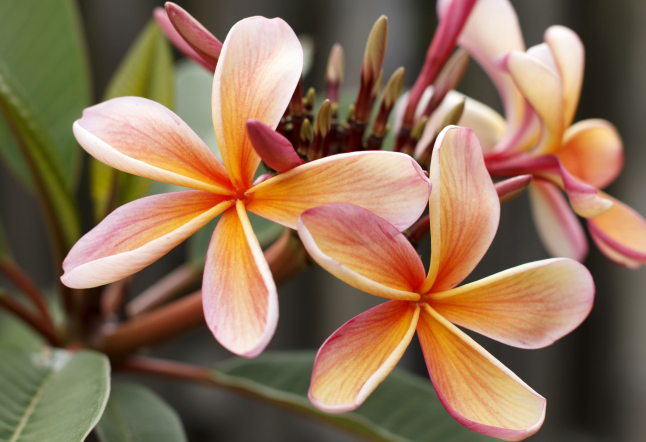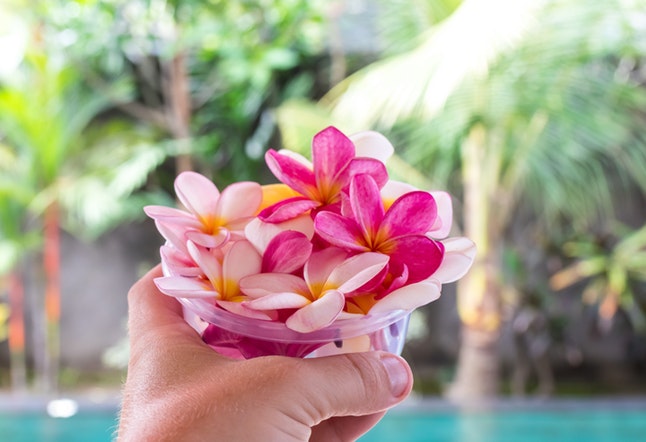Frangipani in Bali: the island’s signature flower

Everywhere you go in Bali — along sidewalks, in temple courtyards, or tucked into offerings — you’ll notice frangipani (locally called jepun or kamboja). These yellow-and-white blossoms are a signature of the island, filling the air with their sweet scent and adding beauty to everyday life.
The cultural role of Frangipani
Frangipanis aren’t just decorative. They are woven into Balinese rituals and daily practices:
- Offerings and ceremonies: Priests and locals place frangipanis in canang sari (daily offerings) and temple rituals.
- Adornment: Women often tuck a flower behind the ear, and dancers wear them in hairpieces.
- Atmosphere: Their petals are scattered at spas, hotels, and restaurants, symbolizing peace and welcome.
That subtle scent of incense you pick up during a morning walk? It’s often from frangipani blossoms being burned or used in oils.

Credit Artem Beliaikin
A flower with tropical roots
Although frangipani (plumeria) is native to Central America, it thrives in Bali’s climate. The classic variety is yellow and white, but you’ll also see vibrant red-and-yellow blossoms, especially around temples. Fun fact: red frangipanis are often more fragrant than white ones.
Where to find frangipani trees
Frangipanis grow almost everywhere in Bali:
- Temples: Planted to provide blossoms for daily offerings.
- Homes and restaurants: For decoration and fragrance.
- Roadsides and sidewalks: Lining pathways with shade and beauty.
Some trees remain small, but in Bali, certain frangipani varieties are cultivated into towering giants. If you’re tempted to pick a flower, locals use a bamboo stick with a V-cut tip to twist blossoms from higher branches. (Pro tip: avoid the milky white sap — it can stain clothes and irritate skin.)
From sacred flower to modern commodity
Traditionally grown for offerings, frangipanis today are also used commercially. Dried blossoms are ground into powders for incense, body lotions, perfumes, and essential oils. Their fragrance has become one of Bali’s most recognizable scents.
Other beautiful flowers in Bali
While frangipani is the island’s signature bloom, Bali is home to many other striking flowers:
- Lotus (teratai): Found in temple ponds and gardens, with white, pink, purple, red, and yellow varieties. Also used in rituals.
- Thunbergia (bunga kelinci): Long cascades of trumpet-shaped blossoms, often white or blue, drape gracefully from balconies and courtyards, adding charm to hotels and homes.
Walking through Bali, you quickly realize flowers aren’t just decoration — they’re woven into the island’s identity, connecting daily life with spirituality and beauty.
Practical details
Local name: Jepun / Kamboja
Scientific name: Plumeria
Where to see them: Everywhere in Bali — temples, homes, roadsides, spas, restaurants
Note: Handle with care, as sap can stain and irritate skin
Read more about Lifestyle in Bali on balipocket.net and follow them on facebook at facebook.com/balipocket/
For more info on Bali’s best spots for the modern yogi STAY | SPA | PLAY | EAT | SHOP | YOGA – Download our ULTIMATE BALI GUIDE for free.
